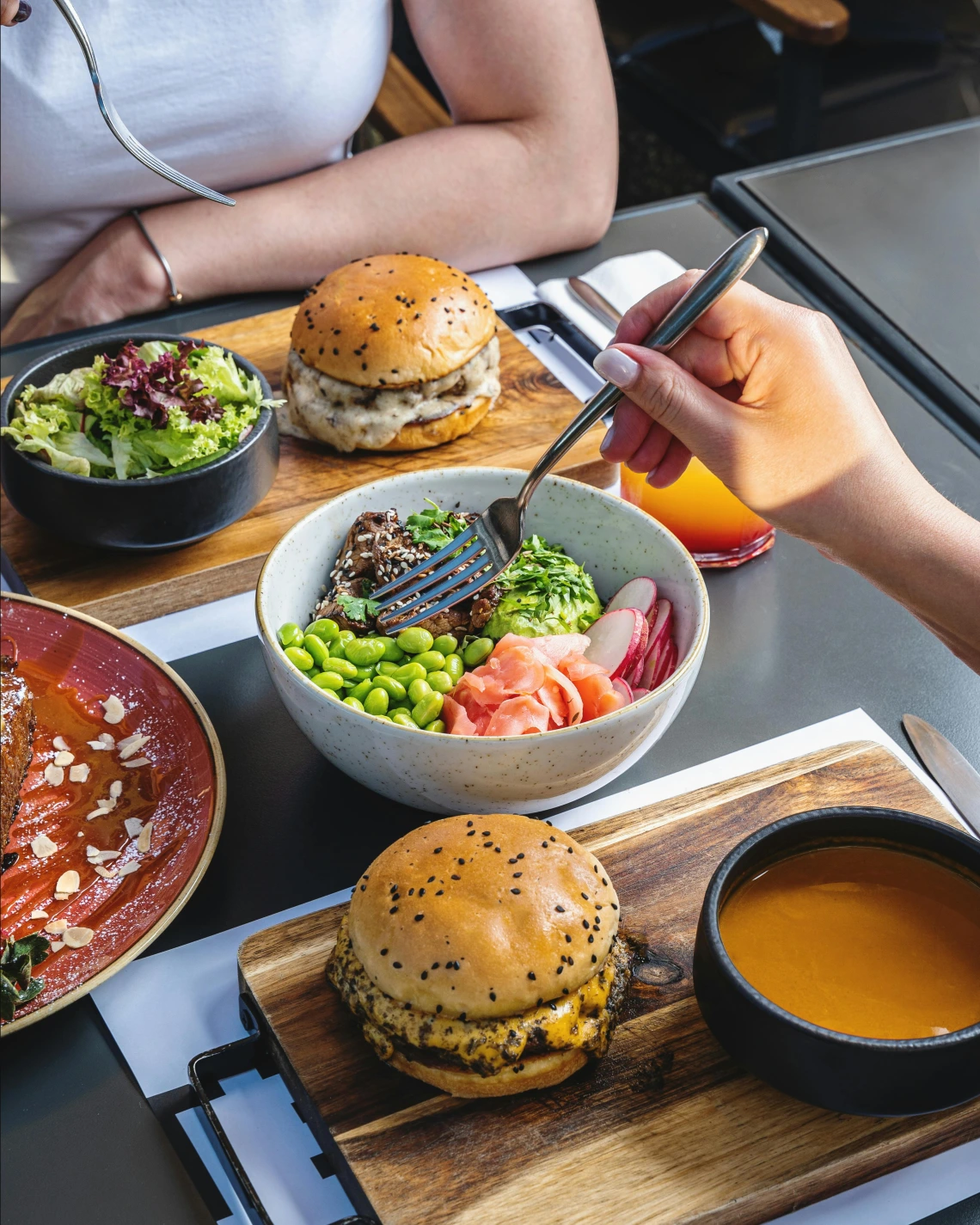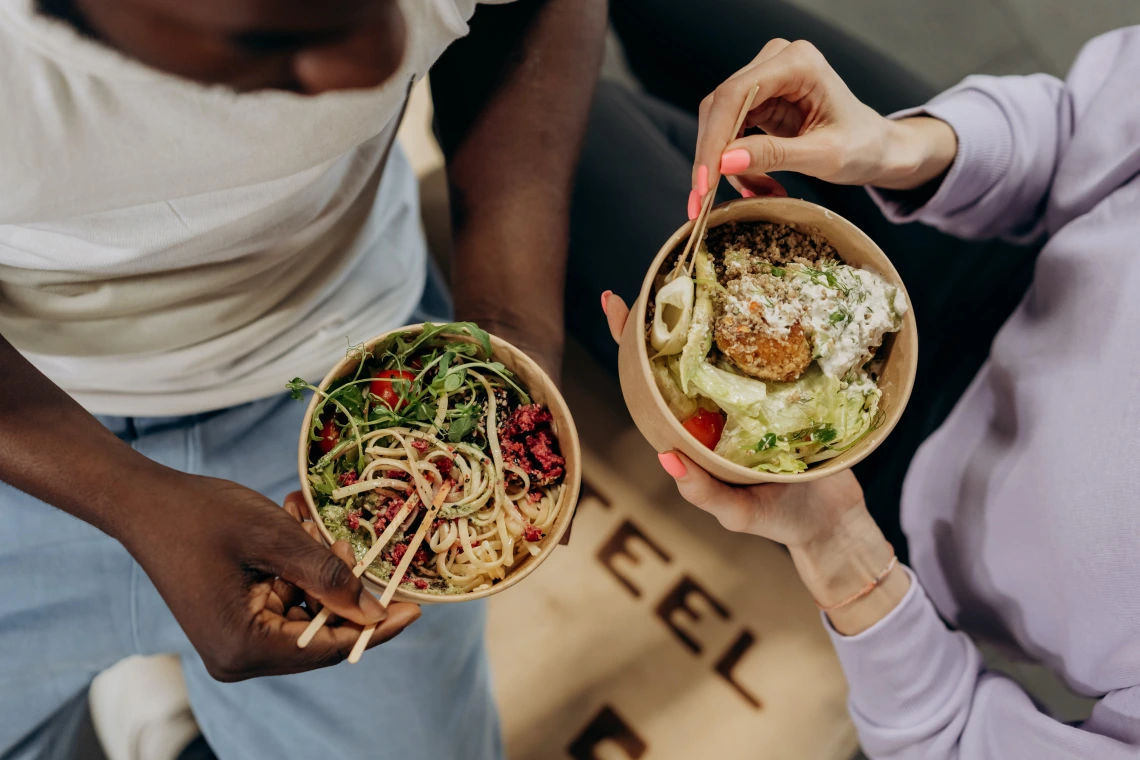Simplifying Nutrition
The path to sustainable, nourishing, and enjoyable eating looks different for everyone. Here are dietitian-backed strategies to help you find yours.

Why We Eat
Food is so much more than fuel for the body. It's also about culture, enjoyment, taste, tradition, connection, personal preferences, and so much more. Seeing food in this way has so many benefits:
- it encourages a more balanced relationship with food
- it helps us move away from seeing foods as "good" or "bad"
- it acknowledges that all foods give us something
You have permission to eat for fun, fuel, and everything in between. This is what simplifying nutrition can look like.
Back to Basics
With all the conflicting information around nutrition, going back to the basics is the key to success. Eating doesn’t have to be complicated—start by seeing where you are, finding what fits, and taking what you need. Stay curious and ask yourself: What’s one step that would make eating more sustainable, enjoyable, or nourishing for you?
Eat Enough (most important)
- eat something throughout the day, every day
- honor hunger cues
- if you are food insecure - use resources like campus pantry, food bank
Enjoy Your Food
- eat foods you like
- focus on satisfaction
- include cultural foods and preferences
- try new foods or recipes
Mix It Up
- give yourself variety
- eat the rainbow
- include multiple nutrients and food groups
- focus on balance, not perfection
Personalize Your Plate
- consider your personal needs and goals
- focus on what you can add rather taking something away
- collaborate with a dietitian and/or medical provider if needed

Building Your Plate
When it comes to meals and snacks, aim for balance and variety. Our bodies were designed to use all the food groups because each food has nutrients that fuel our bodies and brains. Unless you are allergic to a particular food, all food can have a place on your plate, this includes fun foods too! When building your plate, focus on what you can add rather than what you can take away.
Here are some things some of the main food groups can do for you:
- Protein: builds and repairs tissues, provides long-lasting energy, and leaves you feeling full
- Produce (fruits/vegetables): helps overall health and gut health
- Carbohydrates: gives you energy, promotes brain and gut health
- Fats: aids in hormone formation, brain function, gives satiation and flavor
Let's make building your plate simpler, using a flexible formula that adds variety and balance. Choose foods from different areas to create a well-rounded meal—here’s a guide to get you started, not a strict rulebook.
Protein + Produce + Carbohydrate + Fat
Protein
Produce (Fruits & Vegetables)
Carbohydrate
Fat
- dressings, nut/seed butter, oils, condiments, nuts, butter, seeds, olives, and avocado.
The Gut-Brain Connection
Ever been hangry? You know, feeling irritable, snappy, or more stressed when you're hungry. If so, you've experienced firsthand the connection between your gut and brain. What we eat, when we eat, and how nourishing or enjoyable that food is impacts how we feel physically, mentally, and emotionally.
If you've ever had a knot in your stomach, butterflies, lost your appetite, or craved comfort foods when you're stressed, you've also experienced how the way we feel mentally or emotionally impacts our body, specifically our gut.
The gut-brain connection is a two-way street. Nourishing, enjoyable foods sends the signal to our brain and body that all is well, and it keeps the body running smoothly. When something is off in our nutrition or our body can't use the food we eat, it can create stress in our body and brain because they're not getting what they need. And when we're stressed, it's harder for our body to digest food. Fueling your body in a way that's sustainable and enjoyable can support your mental health and help you navigate stress better. Taking care of your mental health can also help you get the most out of the foods you're eating and feel good in your body and your brain!
Quick Facts:
- movement of digestive tract changes during high-stress times (gut discomfort, decreased absorption of nutrients)
- nutrition provides building blocks for happy brain chemicals (serotonin, dopamine, and more)
- the better your nutrition, the more good bacteria you have in your gut, and the better your brain will function

Explore Your Relationship with Food
Relationships are layered, including the relationship you have with food. We eat for lots of reasons and also have beliefs, preferences, and habits when it comes to food. Your relationship with food can impact your physical health, emotional wellness, and how you feel in your body.
Think about your philosophy and behaviors around food, where that came from, and if it's helpful. Here are some questions to get you started:
- do you choose food by hunger cues and preferences?
- does food feel easy or complicated?
- do you eat socially and with spontaneity?
- do you incorporate your culture into food?
- is there room for foods you enjoy in your daily life?
It's possible to have a relationship with food that is sustainable, nourishing, and enjoyable. If your answers to these questions don't feel that way, it's an opportunity to dive deeper and explore what you'd like your relationship with food to look like.
Discover More About Nutrition
Getting in touch with your body’s physical and emotional needs can be hard. Here are some concepts and resources to help approach nutrition with compassion and focus on nourishment, pleasure and well-being, not control or restriction.
Body Trust
Body trust is a concept focusing on a person’s ability to listen to, respect and respond to the needs of their own body. It’s about rebuilding or nurturing a healthy, compassionate relationship with the body within a culture that often promotes body dissatisfaction, diet culture and shame. For more information on this topic check out the book “Reclaiming Body Trust” by Hilary Kilnavery and Dana Sturtevant.
Mindful Eating
Mindful eating is the practice of eating with intention and attention. Intention means choosing food that is both nourishing and satisfying and attention is being fully present for the experience of eating without judgment. Mindful eating is not about dieting or restricting food. Instead, it’s about creating a healthier, more peaceful relationship with food and your body. For more information, “The Mindful Eating Workbook” by Vinvvi Tsui is a compassionate, self-guided resource providing hands-on exercises to explore mindful eating.
Intuitive Eating
Intuitive eating is a mindful approach to eating that encourages listening to your body's hunger and fullness cues, promoting a healthy relationship with food without strict diets or rules. It focuses on hunger and fullness cues, satisfaction, and enjoyment, rather than external factors like calorie counting or societal pressure. The goal is to honor your body's needs while developing a more balanced non-restrictive approach to food.
10 Principles of Intuitive Eating
Support
If you want to explore your relationship with food further or could use some support, connect with a dietitian, a physician, or mental health provider.
